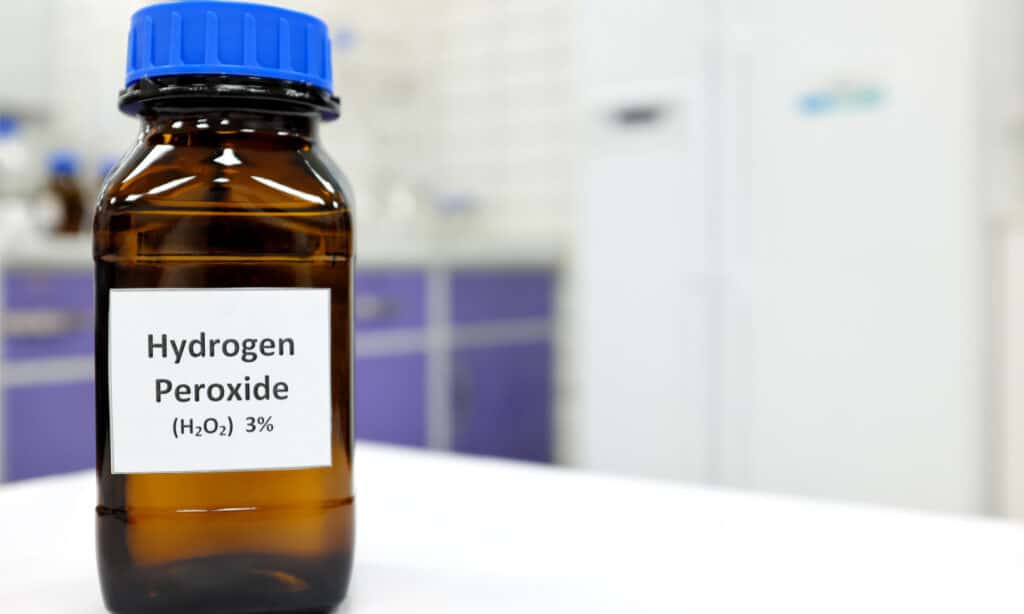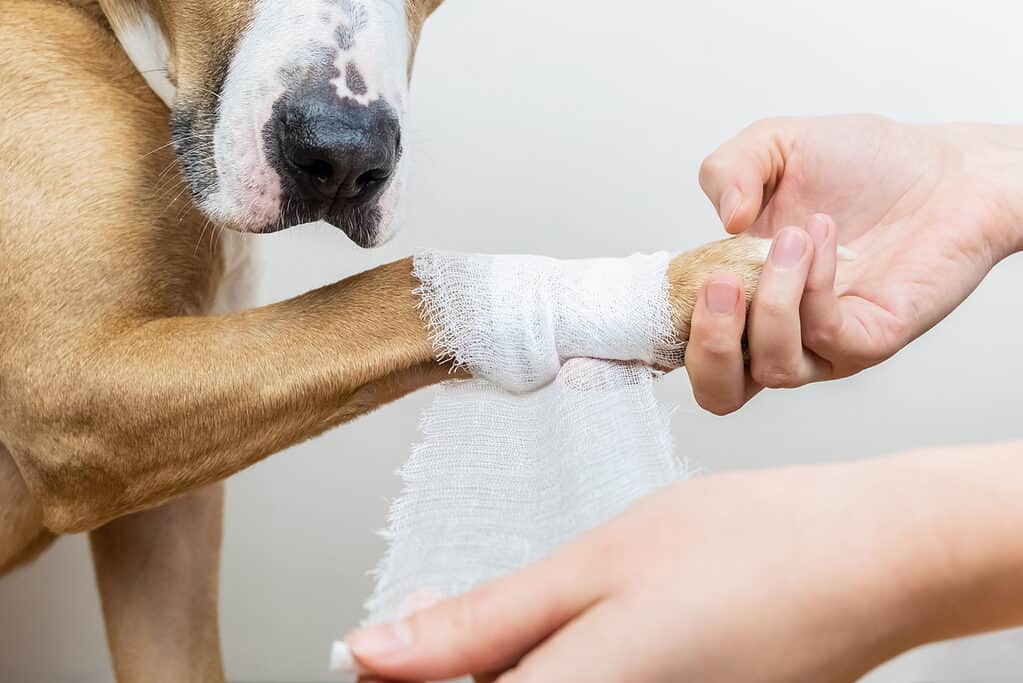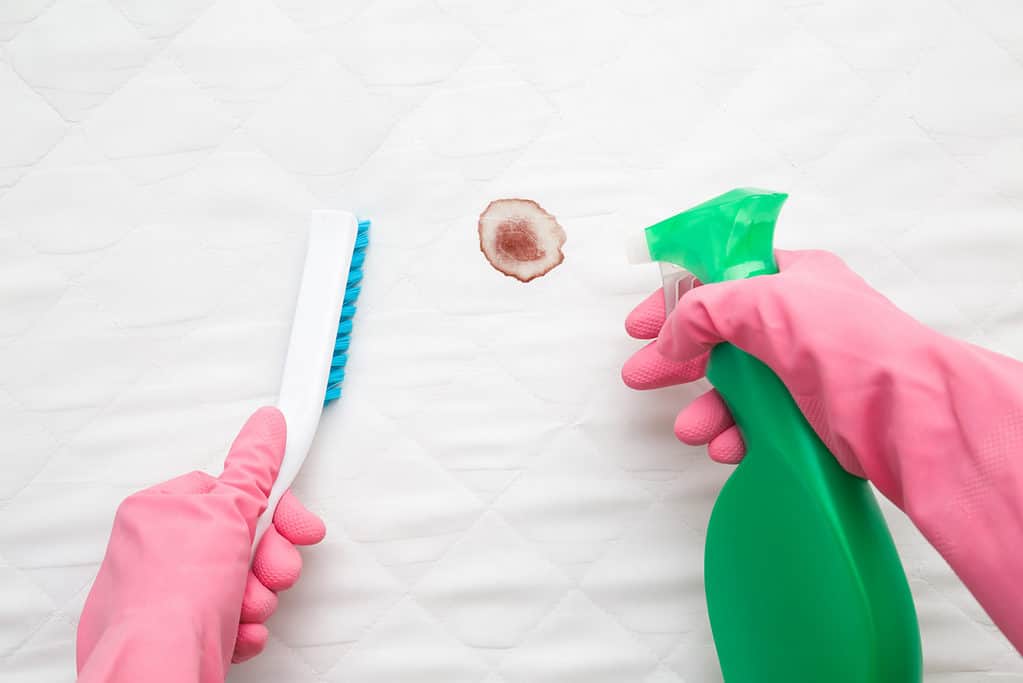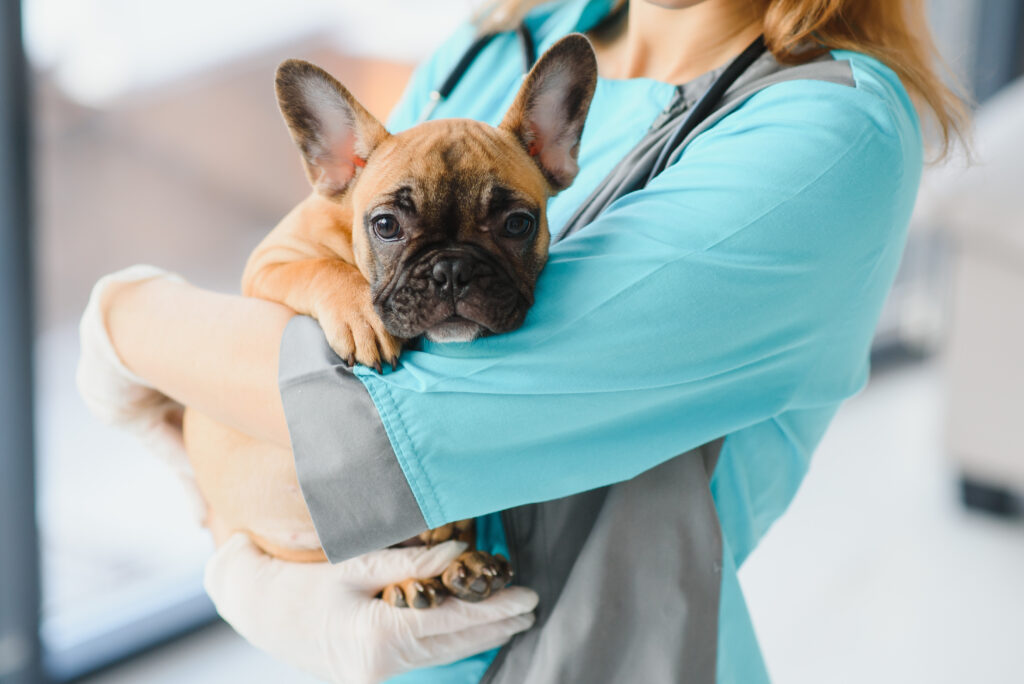Hydrogen peroxide is a mild antiseptic found in most home medicine cabinets. It is used to clean and prevent infection for minor cuts, scrapes, and burns. And can also be used as a mouth rinse to relieve irritation from cold sores and gingivitis. Due to its mild properties, many people believe it can be used to treat dog injuries. But is it really safe? What do the experts say? Discover when you can and can’t use hydrogen peroxide on dogs and what, if any, safe alternatives exist.
Is it Safe to Use Hydrogen Peroxide on Dogs?

Hydrogen peroxide can slow wound healing and cause skin irritation. Most vets recommend you not use hydrogen peroxide to treat dog wounds.
©John Kevin/Shutterstock.com
It is natural to feel overwhelmed and panicked when your pet gets hurt. And many people may instinctually grab their human first aid kit to administer care. But it’s essential to understand that products meant for humans are not always safe and effective for dogs. It is recommended that you do not use hydrogen peroxide to treat dog wounds.
Pouring hydrogen peroxide on a wound can feel satisfying as you watch the bubbles form and hear it actively ridding cuts and scrapes of dirt and bacteria. And while this course is usually desired, it has some drawbacks for pets. Hydrogen peroxide slows down the body’s natural healing process. Peroxide has an extra hydrogen molecule, which kills bacteria. But as it kills bacteria, it also kills off cells called fibroblasts. These cells are needed for proper wound healing. Hydrogen peroxide can also irritate the tissue, generally doing more harm than good.
However, there are differing opinions on the matter. And some veterinarians suggest only using peroxide to clean minor cuts and scrapes or diluting it with water. But all agree that significant gashes and abrasions should be handled by professionals, including cleaning and disinfecting of the wound.
Will it Hurt a Dog to Lick Hydrogen Peroxide?
People sometimes use 3% hydrogen peroxide to induce vomiting in their dogs after they ingest harmful chemicals. But this procedure is typically done under the guidance and direction of a veterinarian. It’s best to avoid letting your dog lick or drink hydrogen peroxide, as it can cause inflammation and ulceration of the gastrointestinal tract. If you believe that your dog has ingested hydrogen peroxide, seek help from your vet’s office.
Alternatives to Hydrogen Peroxide

Use a warm saline solution to flush the wound, pat dry, apply antibiotic ointment, and wrap the wound in a clean bandage.
©iStock.com/photoboyko
Cleaning wounds or your dog’s skin, in general, is an essential step for maintaining health and wellness. But you should take precautions with the products you use. Avoid using hydrogen peroxide, rubbing alcohol, soaps, shampoos, essential oils, or other products not specifically recommended by your vet. Some items can be toxic, slow healing, and cause irritations like rashes.
To keep your dog safe, you can use warm tap water to flush the wound. Or use a warm saline solution by mixing one teaspoon of salt with two cups of water. You should ensure there is no dirt or debris on the wound or surrounding fur and pat the area dry after gently washing with water or saline. You can also use an antimicrobial surgical soap, like chlorhexidine, to kill and prevent the growth of harmful bacteria. However, you should not use chlorhexidine on clean, healing wounds. It is generally safe to use on skin and other body surfaces, but you should still get an okay from your vet before using it on your dog or other pets.
Once the wound is clean and dry, use a small amount of antibiotic ointment and cover it with a clean bandage. This simple method is meant for minor cuts and scrapes. For serious injuries, take your dog to the emergency vet immediately and allow them to disinfect the laceration.
When Can You Use Hydrogen Peroxide on Dogs?

You can use hydrogen peroxide to clean blood stains, pet fur, and dog toys.
©iStock.com/FotoDuets
You should avoid using hydrogen peroxide on your dog unless specifically instructed by a veterinarian. But peroxide can still serve a purpose in your home and when caring for a pet.
- Use hydrogen peroxide to clean the fur surrounding your pet’s injury, taking care not to get it directly on the skin. Fur can become soiled with blood and drainage, but peroxide is an excellent cleaner.
- You can also use peroxide to clean bloody and dirty fabric or dog collars. Hydrogen peroxide is excellent at removing tough stains.
- Combine hydrogen peroxide, baking soda, and dish soap to make a homemade de-skunking solution. Just be sure to not get any in your pet’s eyes or other sensitive areas. This solution will get rid of stinky skunk spray from your dog’s fur.
- And you can use hydrogen peroxide to disinfect dog toys and other items that need a good deep clean.
Can You Use Neosporin To Help With Dogs That Have Cuts?

Neosporin isn’t likely to hurt your dog, but it does come with risks. It’s best to keep the wound clean and dry and see a vet if needed.
©Hryshchyshen Serhii/Shutterstock.com
Now that we found out more about when and how to use hydrogen peroxide when dealing with your pup, let us look at using Neosporin on them.
The good news is that for the most part, it is safe for them in applications much like you would use for yourself or your family. Any cuts or scrapes could benefit from this medicine.
The bad news is that it may be too tempting for your dog to lick off the medicine. In doing so, it would cause them to injest the Neosporin which can cause upset stomachs and intestinal issues. It ultimately depends on the amount taken in and how much over time has affected your pet.
The photo featured at the top of this post is © iStock.com/Daniel de Andres Jimenez
Ready to discover the top 10 cutest dog breeds in the entire world?
How about the fastest dogs, the largest dogs and those that are -- quite frankly -- just the kindest dogs on the planet? Each day, AZ Animals sends out lists just like this to our thousands of email subscribers. And the best part? It's FREE. Join today by entering your email below.
Sources
Thank you for reading! Have some feedback for us? Contact the AZ Animals editorial team.







